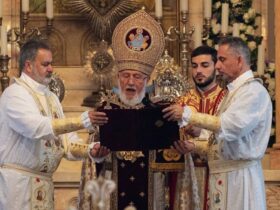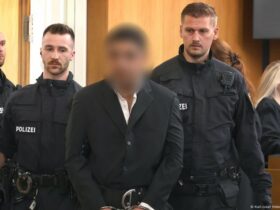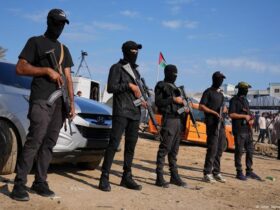In an address to the Bundestag, Germany’s parliament, German Chancellor Friedrich Merz on Thursday called for improved European economic and defense cooperation as a safeguard against economic decline and external security threats.
Most prominently, Merz made the case for enhancing German and NATO defense capabilities in Europe, saying that being “a force for peace in the world” was one of the EU’s founding ideals.
Welcomed ‘historic day’ in Middle East, praised Netanyahu and Trump
Meraz began his address to the lower house of parliament on Thursday by calling the implementation of the ceasefire in Gaza a “historic day”.
“After 738 days of captivity, on October 13, all 20 surviving hostages were freed from the hands of the terrorist organization Hamas, including four German citizens,” Merz said. “They’re home. They’re with their families. And that fills us and me personally with great joy and relief.”
Meraz said their release and the ceasefire were made possible primarily because of cooperation between US President Donald Trump and Israeli Prime Minister Benjamin Netanyahu.
He thanked these two leaders and Egypt’s Abdel Fattah al-Sisi, Qatar’s Emir Tamim bin Hamad Al Thani and Turkey’s Recep Tayyip Erdogan, but did not thank any Palestinian official.
‘Europe… must muster the strength to endure’
Merz said the past week had raised hopes for “real and lasting peace in the region”, but added that he, Germany and the EU could draw lessons from the events.
“Political action makes a difference in this world, for better and for worse,” Merz said. “Europe must make more decisive and integrated use of its capabilities. It must bring its power to bear to shape the world for the better.”
Speaking ahead of a summit of EU leaders in Brussels on October 23, the Chancellor reiterated his support for plans to increase defense spending and for Germany to play a more assertive role within Europe.
“Peace can only exist in freedom when it is based on strength,” Merz said, “with economic strength, with political strength and determination, and also with military strength.”
He said that “historical lessons” had shown EU members that individually they were “economically and politically too small” to influence world events.
He added, “But together, in a coalition, we all have the possibility to help shape a better world.”
Repeated calls to use Russian assets to pay for arms for Ukraine
Addressing Russia’s invasion of Ukraine and the more general threat it poses to Europe, such as recent aerial and drone incursions into EU airspace, Merz accused the Kremlin of waging a campaign of “insecurity offensive” against the continent.
“We will not allow ourselves to be intimidated. We will defend against it,” he said, referring to Germany’s new National Security Council. The first meeting is scheduled to take place in a few days as an example of this proposal.
Merz accused the far-right opposition AfD of helping spread Russian disinformation, prompting applause in the House.
The chancellor also reiterated his call for nearly €140 billion ($163 billion) of frozen Russian assets to be used for arms investment for Ukraine. He said that if Russia could not be induced to negotiate peace, it should be taught that it was far more costly to attempt to win the war militarily.
“These additional funds are to be used exclusively for financing military equipment,” Merz said of the billions of dollars currently frozen in the EU, “paid in tranches, they will secure Ukraine’s military resilience for years to come.”
Merz said that Ukraine would repay the loan only after Russia paid war reparations.
This is a controversial idea in some parts of Europe, not least Belgium, where the money is held. On a recent visit to Berlin, Prime Minister Bart de Wever warned of potential legal and economic implications, at which time Merz also expressed understanding of the concerns.
German leadership in a more competitive Europe
Merz also made the case for greater German leadership within the EU and claimed that neither the EU nor Germany could flourish without the other.
He called for better competitiveness and less regulation at national and EU level, saying, “We don’t need more regulations – we need fewer and better regulations to increase productivity to remain competitive”.
The German Chancellor may prove unpopular in some circles in Brussels next week, given his pledge to oppose the bloc’s current plan to halt registration of all new combustion engine cars by 2035. Although he made no explicit mention of it on Thursday, he appeared to hint at it, calling for more open markets, fewer regulations and fewer restrictions.
“Europe will only become more productive if it fundamentally transforms itself,” he said. “But not only with regulations and certainly not with restrictions, but with open technologies, with innovation, with competitiveness, especially in those technological areas that make environmental protection possible in the first place.”
Edited by: Mark Hallam






Leave a Reply